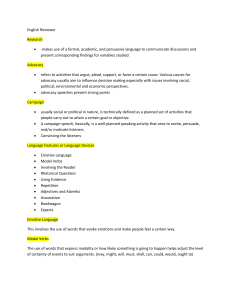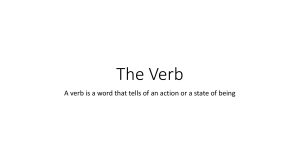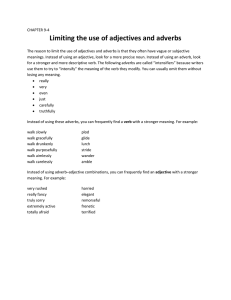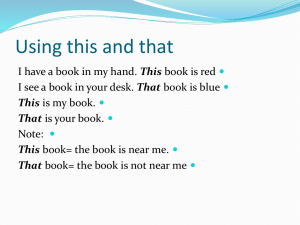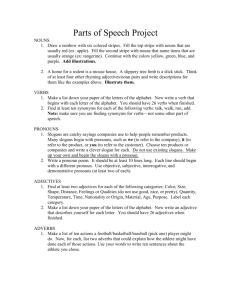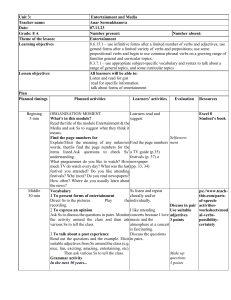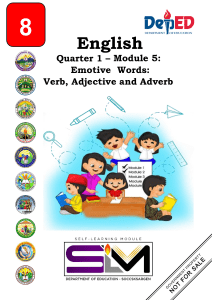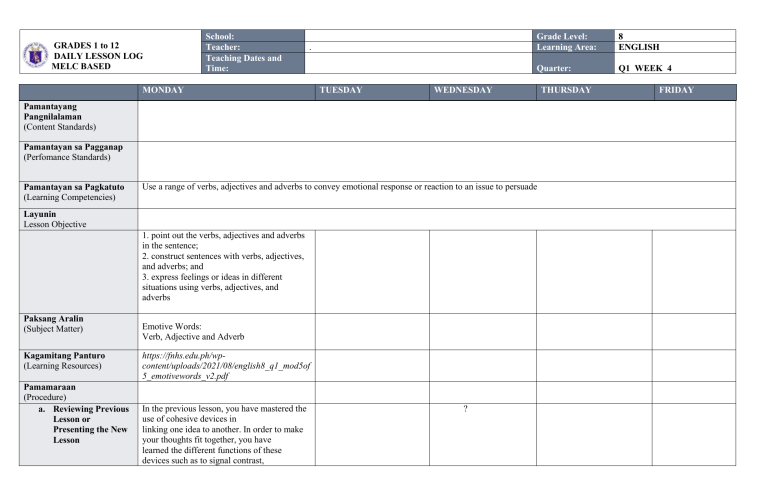
GRADES 1 to 12 DAILY LESSON LOG MELC BASED School: Teacher: Teaching Dates and Time: . MONDAY TUESDAY Grade Level: Learning Area: 8 ENGLISH Quarter: Q1 WEEK 4 WEDNESDAY Pamantayang Pangnilalaman (Content Standards) Pamantayan sa Pagganap (Perfomance Standards) Pamantayan sa Pagkatuto (Learning Competencies) Use a range of verbs, adjectives and adverbs to convey emotional response or reaction to an issue to persuade Layunin Lesson Objective 1. point out the verbs, adjectives and adverbs in the sentence; 2. construct sentences with verbs, adjectives, and adverbs; and 3. express feelings or ideas in different situations using verbs, adjectives, and adverbs Paksang Aralin (Subject Matter) Kagamitang Panturo (Learning Resources) Pamamaraan (Procedure) a. Reviewing Previous Lesson or Presenting the New Lesson Emotive Words: Verb, Adjective and Adverb https://fnhs.edu.ph/wpcontent/uploads/2021/08/english8_q1_mod5of 5_emotivewords_v2.pdf In the previous lesson, you have mastered the use of cohesive devices in linking one idea to another. In order to make your thoughts fit together, you have learned the different functions of these devices such as to signal contrast, ? THURSDAY FRIDAY comparison, addition, sequence, result, and many others. For example, if you want to express contrasting ideas, you use the signals such as in contrast, instead, or on the contrary. To add more, you apply terms like furthermore, also, or moreover while therefore, so, or thus are used to express result.. b. Establishing purpose for the lesson c. Presenting example/instances of the new lesson SHOW VIDEO LESSON ON THIS TOPIC Directions: Rewrite the following sentences by adding appropriate cohesive devices. Write your answer on a separate sheet. Example: Human beings have no gills. They cannot stay underwater for a long period of time. Answer: Human beings have no gills. Hence, they cannot stay underwater for a long period of time. -. 1. They always wear seat belts. They were not injured when the car crashed. 2. Dennis enjoys playing drums. He has a place where he can practice without disturbing others. . 3. Anybody who wears shoes is not allowed to enter the museum. You may enter if you leave your shoes outside. 4. Many adults discover talents that they never knew that had. Uncle Renan became an accomplished pianist in his fifties. 5. Planning a menu that is easy to prepare allows us to have a grand time. It’s the best way to enjoy entertaining visitors d. Discussing new concepts Directions: Pair the emoji to the correct feeling it expresses. Choose the correct answer from the box. Write your answer on a separate sheet of paper : e. Continuation of the discussion of new concepts Directions: Arrange the jumbled letters to form a verb or an adverb that will complete the sentence. Write your answer on a separate sheet. f. Developing Mastery g. Finding practical applications of concepts and skills in daily living DISCUSSION ON EMOYIVE LANGUAGE Directions: Answer the following. Write it on a separate sheet. Test 1 Find the emotive word in the sentence and tell whether it is a verb, adjective or adverb. 1. We were amused of the presentation. 2. The place is tranquil. 3. He prayed fervently to pass the licensure exam. 4. An innocent child relieves stress. 5. The enrolment for this school year was done remotely Test 2 Arrange the jumbled words to make a sentence containing emotive words. Observe correct punctuation and capitalization. 1. eat healthy food kids happily 2. segregated garbage Jonah her 3. a poem cheerfully recites Mario 4. exercise daily teenagers 5. carefully follow instructions to bake a cake, you have to Test 3 Use the following emotive words in a sentence. (maximize) 1. (acquire) 2. (genuine) 3. ( quietly) 4. ( calmly) 5. . h. Making generalizations and abstractions about the lesson i. Evaluating learning j. Additional activities for application or remediation REMARKS REFLECTION a. Number of learners who earned 80% of the evaluation b. Number of learners who require additional activities for remediation who scored below 80% c. Did the remedial lesson work? d. Number of learners who have caught up with the lesson e. Number of learners who continue to require remediation . f. What difficulties did I encounter which my principal or supervisor can help me solve? g. What innovation or localized materials did I use/discover which I wish to share with other teachers?
